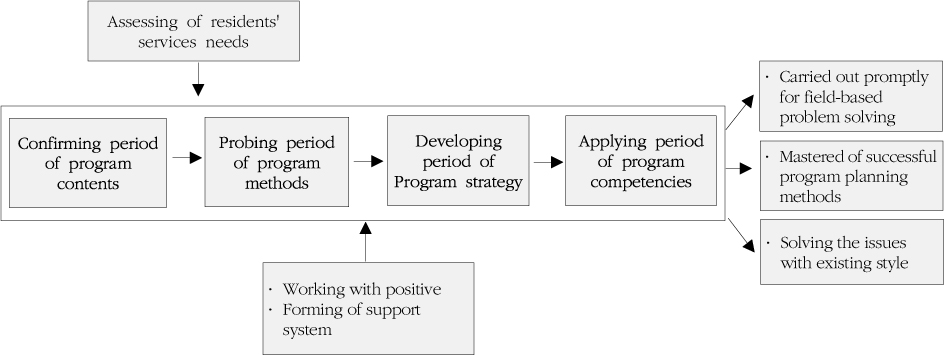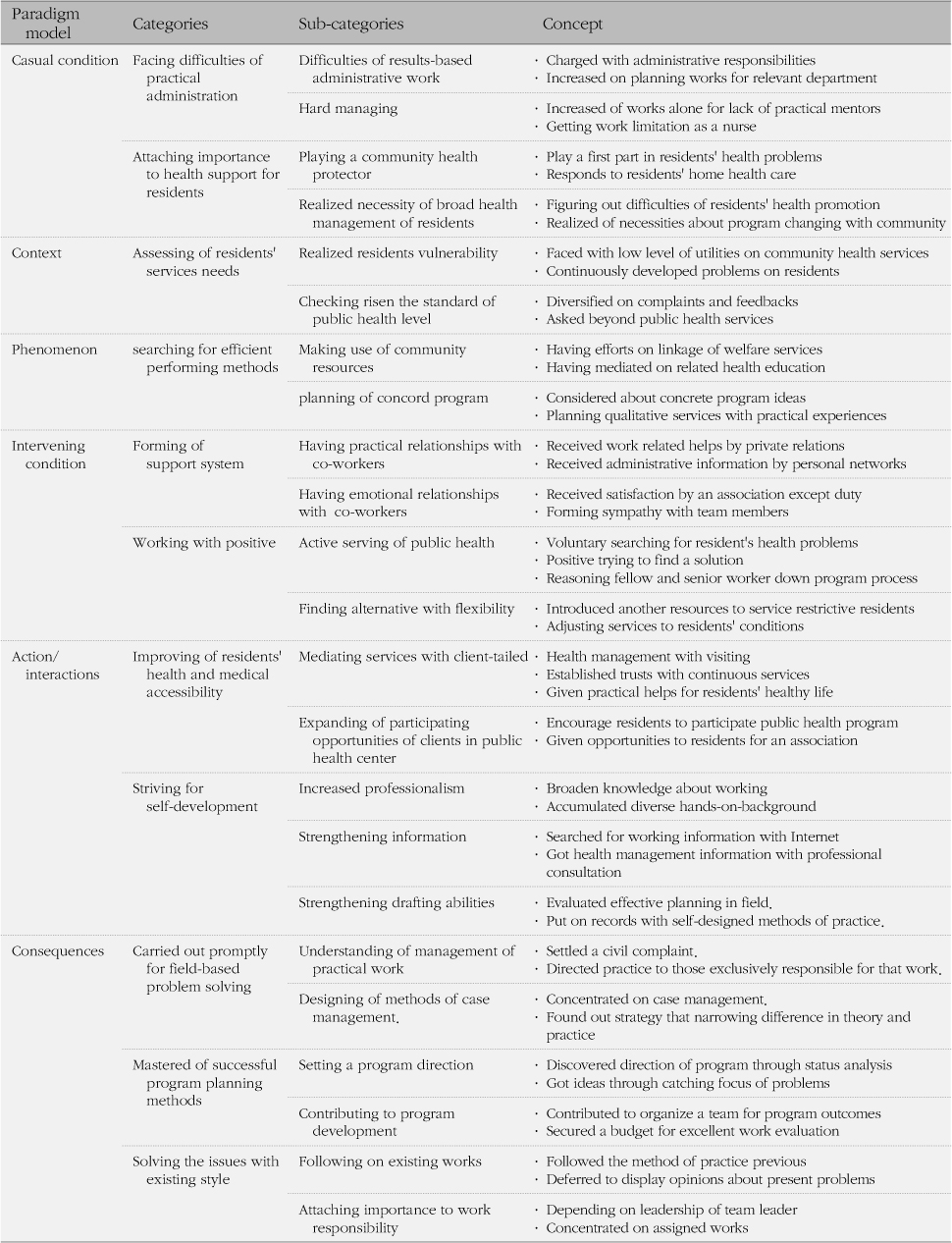Articles
- Page Path
- HOME > J Korean Acad Community Health Nurs > Volume 21(4); 2010 > Article
-
Original Article
- The Process of Nurses' Experience in Public Health Program Performance
- Jeong-Soo Kim
-
Journal of Korean Academy of Community Health Nursing 2014;21(4):468-480.
DOI: https://doi.org/10.12799/jkachn.2010.21.4.468
Published online: April 4, 2014
Post Doctoral Fellow, Division of Nursing Science, College of Health Science, Ewha Womans University, Korea.
• Received: September 21, 2010 • Revised: December 15, 2010 • Accepted: December 15, 2010
© 2010 Korean Academy of Community Health Nursing
This is an Open Access article distributed under the terms of the Creative Commons Attribution Non-Commercial License (http://creativecommons.org/licenses/by-nc/3.0/) which permits unrestricted non-commercial use, distribution, and reproduction in any medium, provided the original work is properly cited.
- 465 Views
- 0 Download
- 2 Crossref
Abstract
-
Purpose
- This study was to describe and develop public health nursing.
-
Methods
- Data were collected from 19 nurses sampled from 5 public health centers. The grounded theory of Strauss and Corbin (1990) was applied.
-
Results
- As a result, 48 concepts, 23 subcategories, and 11 categories were deduced from open coding. In axial coding, casual conditions 'facing difficulties of practical administration' and 'attaching importance to health support for residents' and context condition 'assessing of residents' service needs' impacted phenomenon 'searching for efficient performing methods.' Intervening conditions 'forming of support system' and 'working with positive,' and action-interaction conditions 'improving of resident's health and medical accessibility' and 'striving for self-development' lead to consequences 'carried out promptly for field-based problem solving,' 'mastered of successful program planning methods' and 'solving the issues with existing style.' The periods of process were divided into 4 stages, confirming program-contents, probing program-method, developing program-strategies, and applying program-competencies. The core category, 'strengthening of practical-planning work competencies' incorporated the relationship between and among all categories and explained the process.
-
Conclusion
- This study described public health nurses' performance in Korea. These findings have important implications for the practice and must be considered to develop competencies for planning and practice of public health.
-
This article is based on a part of the first doctoral dissertation from Ewha Womans University.
NOTES
- 1. American Nurses Association. Public health nursing: Scope and standards of practice. Silver Spring, Maryland: American Nurses Association; 2007.
- 2. Bae SS, Ham SG. Activation of health promotion program of public health centers. Korean Public Health Res. 2007;33(1):1–13.
- 3. Chang LC, Liu CH, Yen EH. Effects of an empowerment-based education program for public health nurses in Taiwan. J Clin Nurs. 2008;17(20):2782–2790. ArticlePubMed
- 4. Choi YH. A survey on awareness of health education in the manpower of public health center. J Korean Community Nurs. 2004;15(4):528–538.
- 5. Cutcliffe JR. Adapt or adopt: Developing and transgressing the methodological boundaries of grounded theory. J Adv Nurs. 2005;51(4):421–428. ArticlePubMed
- 6. Hall-Long B. Nursing and public policy: A tool for excellence in education, practice, and research. Nurs Outlook. 2009;57(2):78–83. ArticlePubMed
- 7. Irvine F. Exploring district nursing competencies in health promotion: The use of the Delphi technique. J Clin Nurs. 2005;14(8):965–975. ArticlePubMed
- 8. Kim JS. Improvement of health accessibility for vulnerable people. Public Health Nurs. 2006;13(6):39–65.
- 9. Kim HY. A positive study on satisfaction in public medical service according to types of community people. Korean Gov Rev. 2007;14(2):325–347.
- 10. Kim JS. A study on health promotion experience of elderly women in community health center. Qual Res. 2008;9(1):71–85.
- 11. King MG, Erickson GP. Development of public health nursing competencies: An oral history. Public Health Nurs. 2006;23(2):196–201. ArticlePubMed
- 12. Kim SL, Yu SJ, Choi SE, Lee SH. A comparative study on the commitment of home health care nurse and public health nurses. J Korean Community Nurs. 2001;12(1):39–48.
- 13. Korea Health Industry Development Institute. The development of performance evaluation system in community health centers. Seoul: Moonyoungsa; 2007.
- 14. Lee SJ. Development of an application and expansion plan of manpower for effective activities of public health organization. Seoul: Korean Health Industry Development Institute; 2007.
- 15. MacDonald MB, Schoenfeld BM. Expanding roles for public health nursing. Can Nurse. 2003;99(7):18–22.
- 16. Markham T, Carney M. Public health nurses and the delivery of quality nursing care in the community. J Clin Nurs. 2008;17(10):1342–1350. ArticlePubMed
- 17. Morse JM. Ethnography and issues in mixed qualitative research method design. Seoul: Korea Center for Qualitative Methodology; 2005.
- 18. National Institute of the Korean Language. Standard dictionary of the Korean language 2009;Retrieved December, 26, 2009. from http://www.korean.go.kr
- 19. Park ES, Ryu HS. A study on developing strategies for expanding the roles of public health nurses. J Korean Acad Nurs. 2001;31(4):712–721. ArticlePDF
- 20. Racher FE. The evolution of ethics for community practice. J Community Health Nurs. 2007;24(1):65–76. ArticlePubMed
- 21. Ryu H, Myoung J, Hwang N. An estimation on the need and supply for visiting nursing services for health center in Seoul. J Korean Community Nurs. 2003;14(4):1–11.
- 22. Simonsen-Rehn N, Øvretveit J, Laamanen R, Suominen S, Sundell J, Brommels M. Determinants of health promotion action: comparative analysis of local voluntary associations in four municipalities in Finland. Health Promot Int. 2006;21(4):274–283. ArticlePubMed
- 23. Speziale HJS, Carpenter DR. Qualitative research in nursing. Philadelphia, PA: Lippincott Williams & Wilkins; 2007.
- 24. Strauss AL, Corbin JM. Basics of qualitative research: Grounded theory, procedures, and techniques. Newbury Park, CA: Sage Publications; 1990.
- 25. Sung KW. A comparative study on main role, professional self concept and job satisfaction of public health nurses and clinical nurses. J Korean Acad Nurs. 2002;32(2):219–230. ArticlePDF
- 26. World Health Organization. The Ottawa charter for health promotion. Geneva: World Health Organization; 1986.
- 27. Zurmehly J. A Qualitative case study review of role transition in community nursing. Nurs Forum. 2007;42(4):162–170. ArticlePubMed
Figure & Data
References
Citations
Citations to this article as recorded by 

- Curriculum Integration of Communication Simulation to Community Health Nursing Course for Nursing Students: Pilot Study
Yi-Kyung Ha
Journal of the Korea Academia-Industrial cooperation Society.2015; 16(4): 2329. CrossRef - Looking Back the Past 30 Years: Activities and Achievements of Community Health Practitioners in Rural and Remote Areas in Korea
Chunmi Kim, Kyung Ja June
Journal of Korean Academy of Community Health Nursing.2012; 23(1): 51. CrossRef

 KACHN
KACHN


 PubReader
PubReader Cite
Cite


